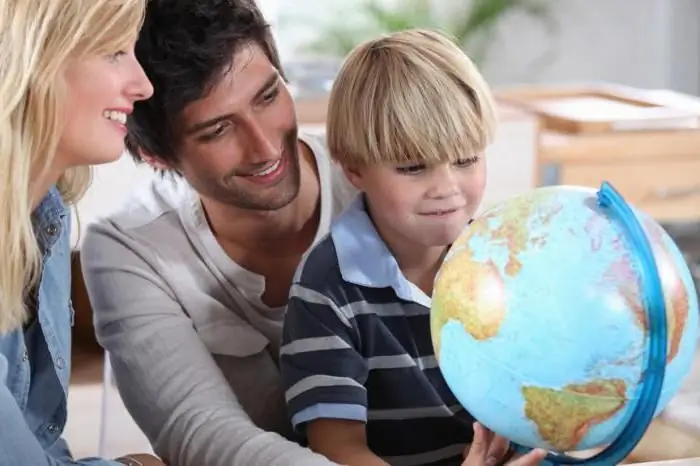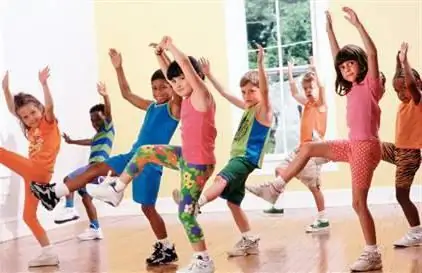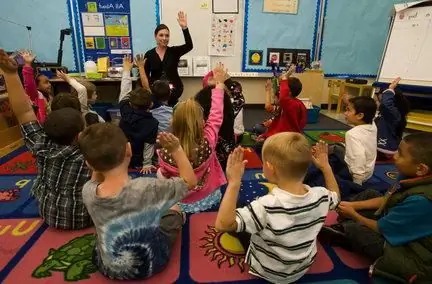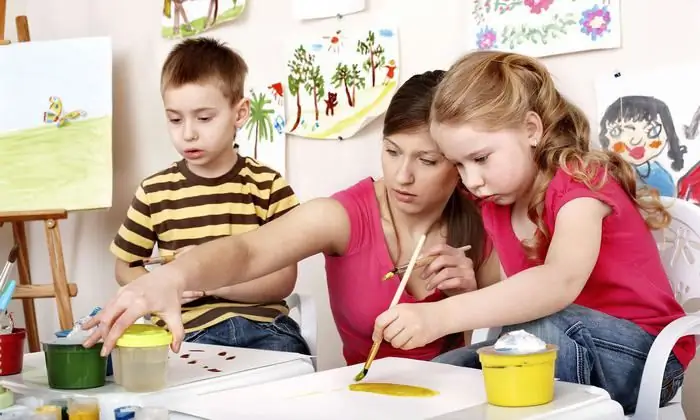2026 Author: Priscilla Miln | miln@babymagazinclub.com. Last modified: 2025-01-22 17:55:23
A little man, just born, without even realizing it, begins to get acquainted with his environment: the baby sees his mother for the first time, hears sounds, feels warmth and comprehends many other unexplored mysteries around him. Every year such knowledge becomes deeper, and research methods become more complicated. Undoubtedly, adults become guides in this process of discovering the world as a child. In the first years of life, these are parents and people from the immediate environment, and starting from toddler age, revealing the “secrets” around the baby is the professional task of educators of preschool and out-of-school institutions. In this regard, in kindergartens, classes on the outside world are included in the program. The preparatory group pays special attention to this section of the program. We will tell you what features the teacher should take into account whenwork with this age group and how to achieve the educational goals.

Objectives of the world around us
If earlier there were clear frameworks and goals that the educator had to carry out in his professional activities, then with the introduction of the federal state educational standard, the situation has changed exactly the other way around. Today, the task of a teacher is not so much to give specific knowledge to children, but to develop cognitive activity in their pupils, the ability to research, analyze, generalize knowledge. Accordingly, now they are taking a creative form of studying the world around them in the preparatory group. Familiarization with nature is carried out in such a way that children become active participants in the "discovery" of new information.
Let's explain using the example of a lesson on the world around us on the topic: "Autumn". If earlier it was enough to show children pictures of leaf fall, rain, tell about changes in the lives of animals and people at this time of the year, today the most effective form of conducting such a lesson will be an excursion, during which the children themselves (under the unobtrusive guidance of the educator) will determine changes in the environment. environment. For example, they will collect bouquets of fallen leaves (which can then be used to consolidate knowledge in aesthetic classes), measure the air temperature with a thermometer, observe the behavior of birds, insects, and much more.

The role of environmental studies in the preparatory group
Classes around the world in the preparatory group occupy an important place in the entire educational process. This is due not only to preparing future first-graders to the maximum for independent activities and orientation in the school team, but also to the increased capabilities of the children themselves. And today, educators have ample opportunities to choose methods and techniques for presenting material, and their pupils are active participants in learning.
Knowledge Integration
Classes around the world in the preparatory group - a wide range of different knowledge. Starting from the age of three, children begin to be actively interested in everything that happens around them. That is why at this age children are called "why". For pupils of the preparatory group, knowledge of the environment is also very important. Grown up children can already independently learn and unravel the secrets of the unknown. The task of the educator at this stage is to develop curiosity, cognitive activity, guide the kids to the correct conclusions and conclusions, and directly coordinate the learning process.
Classes on the world around in the preparatory group are held on such topics:
- Introduction to animals and plants.
- Seasons, months, days of the week. Time.
- The space around us. Basic geographical knowledge. Space.
- Objects and their purpose. Professions.
- Sensors. Direction. Orientation in space.
- Society: kindergarten, family, country.
- The concept of one's own "I".
- Human labor activity.
- Self-service.
- Etiquette.
- Aesthetic development.
- Speech and communication.
Daily staying in a preschool institution, the child discovers something new from the above areas of knowledge, thus consolidating and expanding the already existing baggage of information about the world around.

Recommendations for conducting classes
In the preparatory group, methods and techniques should be chosen other than in the younger groups. Such a recommendation is related to the age characteristics of children, as well as the goals of the educational program.
During classes on the outside world, pupils, as they say, do not sit still. Therefore, such forms of conducting classes as a walk, excursion, travel, research, experiment, quest game are effective and interesting for children. As an example, we can cite classes on the world around us in the preparatory group on the topic: "Autumn". You can come up with "stations" at which information and tasks are given on a specific phenomenon: rain, leaf fall, animal behavior in autumn, people's work.
The knowledge gained is required to be consolidated daily in the future not only in other classes (for example, on the topic "Autumn" in a lesson in fine arts, leaf fall is drawn or an application is made), but also by applyingpractical skills and abilities (children measure air temperature every morning, keep diaries of precipitation, etc.).

Shaping ecological perceptions
The teacher is faced with the task of instilling in children a careful, responsible attitude towards the world around them and wildlife. To achieve such goals, an important aspect is the availability of the necessary material and technical equipment in the group. In addition to the methodological material, it is recommended to create a "corner of wildlife" together with the children. Thanks to him, pupils will not only watch animals and plants with great pleasure every day, learn to care for and protect them, but also practice communication, teamwork, and form friendship.
A corner of nature on a walk
On a walk, you can organize the cultivation of a flower bed or vegetable garden, build a birdhouse and feed the birds. Children receive knowledge easily and naturally thanks to this form of learning about the world around them in the preparatory group. Acquaintance with the secrets of wildlife is carried out by practical methods, giving the child the opportunity to show their skills and abilities, to fulfill themselves.

Class Forms
Kindergartens use various forms of conducting classes around the world: individual, frontal and group. So, for example, everyone can observe the behavior of fish in an aquarium.together, and only a few people will be responsible for watering the flowers on one day - on duty, you can entrust feeding to one child.
Development of speech in the classroom around the world
The development of correct literate speech is the overall task of the kindergarten educational program. We must not forget about this aspect in the classroom around the world. Today, thanks to technological development, it will not be difficult for the educator to find literary works of different genres and corresponding to any subject.
The main forms are poems and fairy tales. So, classes are held around the world around in preparatory speech development using poetic forms that are easy to memorize, which children immediately learn by heart. And, therefore, the material is absorbed faster, more naturally and remembered for a long time. An interesting form is rhymed outdoor games or theatrical environmental performances.
In the classroom for the preparatory group, the vocabulary of children should be expanded: introduce new terms for pupils, include adjectives and complex sentences. You can invite children to describe the nature around or a flower seen on the street, while asking the kids to use different forms of words, phrases and sentences. For example, offer such a ball game: children become in a circle; passing the ball to a neighbor, you need to answer the question of the teacher about what the weather is today (sunny, clear, rainy, gloomy, cool, windy, etc.).

Aesthetic and artistic development
Undoubtedly, knowledge of the surrounding world is expressed in aesthetic and artistic manifestation. In addition, in this way, previous classes on the outside world in the preparatory group are consolidated. Familiarization with drawing, appliqué and modeling thematically resonate with educational material. At the same time, children develop aesthetic abilities, fine motor skills (which, in turn, are directly related to speech), an individual worldview is formed, self-realization and self-expression of the child occurs.

Work activity
Despite the fact that according to the Federal State Educational Standard it is not recommended for children to work, most teachers tend to believe that such a process disciplines, develops and teaches at the same time. Indeed, by watering the flowers, the child did not so much "work" physically as he showed concern for wildlife, realized himself in independent activities, and received encouragement from the team. It is only important to pay attention to the fact that the activity gives pleasure to the child, is not forced, and even more so is not a means of censure. If the teacher requires the child in an authoritarian tone to clean up, for example, overturned bread, then there will be little benefit from such an activity, or rather, none. The same situation can be solved in a completely different way. For example, on the same day, conduct a lesson on the outside world on the topic: “How is bread grown?”
Classes around the world in the kindergarten preparatory group is a creative process, each teacher chooses the appropriate methods and techniques for working with their kids. It is important to give children the opportunity to express feelings, experiences. Let the kids “touch” nature with their heart and soul, only then it is possible to achieve the goals set for education.
Recommended:
Plan of work in the preparatory group with parents. Reminder for parents. Advice for parents in the preparatory group

Many parents believe that only teachers are responsible for the education and upbringing of a preschooler. In fact, only the interaction of preschool workers with their families can give positive results
Development of speech in the preparatory group. Abstract of a lesson on the development of speech in the preparatory group

This article talks about the organization of the speech environment for future first-graders within the walls of the kindergarten. Various methods for developing speaking and communication skills are described here. The information presented in the article will be a good hint not only for preschool teachers, but also for parents
Synopsis "Physical training in the senior group". Summary of thematic physical education classes in the senior group. Summary of non-traditional physical education classe

For children of older groups, many options for organizing a lesson are prescribed: plot, thematic, traditional, relay races, competitions, games, with elements of aerobics. When planning, the educator draws up a summary of thematic physical education classes in the older group. Its main goal is to show children how to strengthen and maintain he alth with the help of general developmental exercises
Classes in the preparatory group for GEF. Classes in drawing, ecology, the world around

Classes in the preparatory group should prepare the child for school. The best way is to learn by playing. This opportunity is provided by new standards of education
Average group of kindergarten. Classes in the middle group

The article describes the features of teaching and educating children of the middle group of kindergarten. It is noted how they differ from pupils of other groups. It is told how to properly organize the environment so that it contributes to the development of children. The program tasks are presented, which must be adhered to when planning the activities of children in kindergarten. The article will be useful to teachers of preschool institutions

